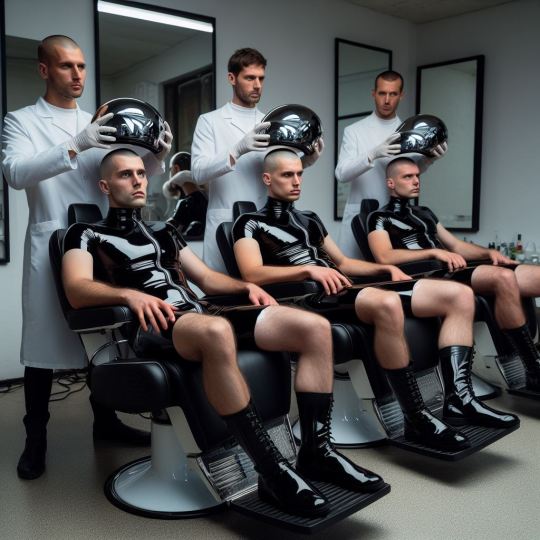#Over-Reliance on AI
Explore tagged Tumblr posts
Text
Researchers Warn: AI's Negative Effects
Touchaheart.com.ng reports that Artificial Intelligence (AI) has rapidly integrated into various aspects of our daily lives, transforming how we work, communicate, and solve problems. While AI offers numerous benefits, including increased efficiency and convenience, researchers are increasingly concerned about its potential negative impact on critical thinking, analysis, and other cognitive…
#AI and Education#AI Benefits#AI Impact#AI in the Workplace#AI Literacy#Analytical Skills#Cognitive Processes#Critical Thinking#Human-AI Collaboration#Over-Reliance on AI#Touchaheart.com.ng
0 notes
Text
Genuinely believe it's the biggest killer of creativity, independence and initiative because what the hell do you mean you can't even write an email without it anymore??? Reading articles? Drafting messages? Essays and homework? What do you mean you need it to write out your story ideas and sentences or give you prompts? And don't even get me started on AI art 🥱
You have a brain. Mans greatest computer - please, I beg of you, please do not use a shitty algorithm that hopelessly mines, steals and scrapes together whatever it can muster to only produce the most mediocre and impersonal response.
I promise you, without a shadow of a doubt, anything that YOU create instead will be infinitely better...because it's unique - it's all yours. Be proud of your creations, because you did that. No-one else and certainly not some computer system that just scanned through copious amounts of data and mushed it together.
Whump community Reblog if you hate AI
it ruins the whole point of art
#not me coming off my hiatus to rant about AI#god I just hate it#its so lazy#I work in a highschool and the amount of kids that whack their homework into chatgpt#or they have a research task so they ask gemini to write it#I take their work off them and ask them to tell me what is on their paper - and they can't tell me a thing. even what some words mean#And I know its like copying and pasting but its just... over reliance. theres no independence with it#anyway - can you tell I despise AI#all my homies hate AI.#and I know too many people that use it for the most mundane tasks
1K notes
·
View notes
Text
the prominence of AI in art and writing right now actually has a lot in common with the old WASPy 1950s cooking trends we now all scoff at, specifically the over-reliance on what is perceived as high-tech and futuristic, the belief that anything that comes "from science" must inherently have value and be superior to the more organic older methods, the leveraging of a supply chain that is all geared up to destroy the earth, and also an end result so uncanny it is bordering on surreal.
what gets called AI today truly is the shrimp jello of tomorrow.
5K notes
·
View notes
Text
A Tribute To Helmets
I grew up during the Apollo space missions, and whilst I didn't show a particular interest in NASA's exploits, I received a kid's space suit and helmet as a present. I vividly recall how different things sounded when I put the helmet over my head. I think that was the point when my kinky fascination for helmets began.
From my childhood, I remember watching an episode of the early Flash Gordon series (in monochrome) where Ming places a helmet on the head of one of his dissenting subordinates. Once the helmet was strapped on, the man became compliant, passive and drone-like.
At that moment I realised that something designed for safety and protection could also have very nefarious uses. Combined with visual and audio stimulation, the helmet could also contain electronic circuitry that can disrupt the natural processes in the brain. Helmets could also contain syringes, which can deliver chemicals and other substances directly into the head to suppress and indivual's throughts.

So here is my AI tribute to the Helmet, and how, when placed on the head it can strip away emotion, knowledge, purpose and individuality.
This man in his early twenties was just starting out in life. He had dreams of being successful, having the perfect suburban life - wife, kids and the kind of home people dream of. He had just agreed to join a multinational conglomerate, and as part of his induction he was required to take a medical. So on the appropriate day at the specifed time he turns up for what he thought would be a routine appointment.

On arrival, he was taken into a private room. He was asked to disrobe and was given a set of leathers and boots to wear, which, despite all his reservations he put on.

Once the leathers were zipped up and boots were on his feet, he was escorted to a room where a lab assistant placed a full-face helmet onto his head. He was then taken into a room filled with tech and video screens. The technician typed some commands into a computer and the helmet activated.

Isolated wearing the helmet, he was subjected to audio and visual stimulation; stripping away his own throughts and identity. Replacing it with a predetermined 'template', which the company would deploy as necessary. Thoughts of family, kids and friends replaced with absolute loyalty to the company.

'Physical' completed, the company has deployed him 'into the field'. Now a biker, his primary objective is to ride around and recruit candidates to join the company.
Meanwhile...

Some scientists are about to record the disruptive effects of their advanced helmets on three 'volunteers'. Once the helmets are fitted the volunteers will follow instructions and head to drone processing.
Elsewhere, two cyclists have been given new 'aerodynamic' helmets for a week to try.

Affixed to their heads, they will have no desire to ever remove their helmets - ever.
Sticking with a sport theme, the new coach has provided the team with revolutionary and technologically advanced helmets. These not only offer superior protection to the head, but also allow the coach a direct interface into the players' minds. It's going to be a successful season for this team.

There are worried faced amongst this army platoon - and they should be worried.
They will follow the General's orders to place the helmet on their heads. When they do their individual thoughts will become suppressed as they turn into droned soldiers. No more briefings, no reliance on old technology like radio transmissions, which can be hacked into by the enemy. The helmet will ensure all orders issued by the commanders are transmitted directly into their brains.

There are changes afoot in civilian life too. A new force for law and order is being created. One by one members of the police force are invited to undergo a routine medical.

Soon they will all be fitted with helmets; permanently connecting them directly to the company network, with orders transmitted directly into their brains.
There is to be a zero tolerance of crime - even minor misdemeanors. So they begin to 'clean up the streets'.

Chavs and scallies are rounded up and each one is fitted with a helmet...

Once the work of the helmet is done, a new 'drone' is sent out onto the streets as a 'recruiter' for the company.

They're also recruiting in colleges and universities...

And back in the boardroom, the executives are monitoring progress of the company's plan.

Each member of the so-called 'C-suite' has been given a helmet to allow speedier decision making and negate the need for laptops, smartphones and video screens. Directly connected to the company's network through their helmet, they follow the instructions fed directly into their brains - following them to the letter. After all each helmet ensures they are exemplary servants of the company.
Hope you enjoyed my AI tribute to the helmet. Depending on the feedback I might do a second helmet blog.
Oh, in case you were wondering which is my favourite helmet, it's my Arai Corser, pictured below.

282 notes
·
View notes
Text

Billboard project
* * * *
One for the history books!
September 12, 2024
Robert B. Hubbell
After delivering one of the best debate performances in American political history, Kamala Harris is receiving begrudging and stinting praise from many in the media and commentary class. But 67 million people saw Kamala Harris demonstrate she is made of presidential timber. They witnessed a masterful performance that revealed a penetrating intellect tempered by decency and humanity. On the substance and execution, she should have earned the support of all voters and unqualified praise from the media and political commentators.
Trump's performance was vile and disqualifying. It was worse than Joe Biden’s widely panned debate by far. While Joe Biden turned in a horrible debate performance as measured by the artificial rules of made-for-tv spectacles, Donald Trump made dozens of statements that were objectively depraved, racist, antidemocratic, delusional, and deceitful.
Trump transcended the debate format and devolved into fascist demagoguery that should have resulted in universal condemnation by all voters, the media, and political commentators. If Joe Biden was driven from the presidential race because of his poor debate performance, Trump should be banished from politics, expelled from his party, and relegated to a place of dishonor in the annals of American history.
Talking about the debate is difficult because of the urge to focus on Kamala Harris’s brilliantly executed strategy of baiting Trump into ranting about his insecurities and the horror of Trump's worst-in-the-history-of-the-nation performance on substance.
I get it. Harris’s ninja debating moves and Trump's racist deer-in-the-headlights stare made for riveting television. But we focus on those aspects of the debate to the detriment of the substance of Kamala Harris’s message. She spent a substantial portion of the debate discussing her policies and her plan to help heal the divisions that beset America.
It is disappointing to see so many stories and commentators describe the debate as “fierce” or “contentious.” I heard one commentator on MSNBC bemoan the fact that neither candidate seemed interested in bridging the divide in America. That is false. Kamala Harris promised to be a president for all Americans and to focus on the needs of the people, not the needs and wants of the president. She said, in part,
And I think the American people want better than that. Want better than this. Want someone who understands as I do, I travel our country, we see in each other a friend. We see in each other a neighbor. We don't want a leader who is constantly trying to have Americans point their fingers at each other. I meet with people all the time who tell me "Can we please just have discourse about how we're going to invest in the aspirations and the ambitions and the dreams of the American people?" [¶¶] I've only had one client. The people. And I'll tell you, as a prosecutor I never asked a victim or a witness are you a Republican or a Democrat. The only thing I ever asked them, are you okay? And that's the kind of president we need right now. Someone who cares about you and is not putting themselves first. I intend to be a president for all Americans and focus on what we can do over the next 10 and 20 years to build back up our country by investing right now in you the American people.
Kamala Harris repeatedly offered her policy vision for America, including tax breaks for business startups; subsidizing downpayments for first-time home purchases; incentivizing the construction of starter homes; granting tax credits for families with newborns; investing in American chip technology, quantum computing, and AI; supporting worker’s rights; reducing reliance on fossil fuels; granting tax cuts for the middle class; requiring the ultra-wealthy to pay their fair share of taxes; and protecting the Affordable Care Act, Medicare, and Medicaid. She also promised to protect reproductive liberty, LGBTQ equality, and voting rights of all Americans.
The media has hounded Kamala Harris for weeks about the alleged absence of policies in her campaign. On Tuesday, she talked about dozens of specific policies—and the media is not saying a word about those policies after the debate.
Not. A. Word.
It’s almost as if the media didn’t really care about Kamala Harris’s policies but were only interested in a talking point they could use to criticize her. Hypocrites!
So, before talking about how well Kamala Harris executed her strategy of baiting Trump and how abhorrent Trump's performance and positions were, let’s give Kamala Harris her due on the substance: She gave a presidential-level discourse on policies that will affect the lives of hundreds of millions of Americans. The fact that Trump and the moderators ignored those policies does not diminish the respect she showed for the American people by clearly setting forth her policies if elected as president.
Among the many insipid criticisms of Kamala Harris was that she used facial expressions to convey her disapproval, amusement, and disbelief over Trump's utterances. This was an effective use of her non-speaking time and allowed her to diminish Trump without saying a word.
Dahlia Lithwick demolishes the critics who faulted Kamala’s facial expressions—a criticism that would only be leveled against a woman. See Dahlia Lithwick, Slate, Harris–Trump debate: Kamala Harris’ face on Tuesday was the stuff of legend. (slate.com). Lithwick writes,
It must be beyond maddening for a political actor to be summoned into a “debate” that is not really a debate, pitted against some frothing amalgam of WWE reenactor and Tasmanian devil, warned that your microphone will be muted while he is speaking, cautioned that he will be allowed to talk over you and the moderators, then be criticized for … blinking? [¶¶] Harris’ face roamed free and far on Tuesday, and it was thoroughly warranted and frequently enjoyable. I think of her mobile, legible face as a satisfying call-and-response to Trump’s lifelong preference for female adulation and Botox. Women have faces. Their faces have expressions. If that was upsetting to you during Tuesday’s debate, you might be dismayed to learn that deep beneath our expressive faces lie thoughts, dreams, frustrations, and other markers of human agency. If a woman smiling freaks you out, imagine what happens when a woman votes.
While talking about Kamala Harris’s facial expressions may seem superficial, it is not. One of Harris’s most significant accomplishments was her ability to show herself to be a likable, relatable human being. She did so by using the medium of television to her advantage. Were the expressive facial reactions real or practiced? It doesn’t matter; they were successful. People liked Kamala Harris. For a candidate who has been on the national scene since 2018, the percentage of voters who still say they don’t “know” her is shocking. But she went some distance in the debate to introduce herself to those voters in a positive way.
Among Harris’s many pointed and powerful answers on Tuesday, none were better than her response to Trump's gloating over the demise of Roe v. Wade. Harris said,
In over 20 states there are Trump abortion bans which make it criminal for a doctor or nurse to provide health care. In one state it provides prison for life. Trump abortion bans that make no exception even for rape and incest. Which—understand what that means. A survivor of a crime, a violation to their body, does not have the right to make a decision about what happens to their body next. That is immoral. And one does not have to abandon their faith or deeply held beliefs to agree: The government, and Donald Trump certainly, should not be telling a woman what to do with her body. You want to talk about, this is what people wanted? Pregnant women who want to carry a pregnancy to term, suffering from a miscarriage, being denied care in an emergency room because the health care providers are afraid they might go to jail, and she’s bleeding out in a car in the parking lot? She didn’t want that. Her husband didn’t want that. A 12 or 13-year-old survivor of incest being forced to carry a pregnancy to term? They don’t want that. Understand in his Project 2025, there would be a national abortion—a monitor that would be monitoring your pregnancies, your miscarriages.
There is more room to praise Kamala Harris’s performance in the debate, but we must turn to Trump's horrific statements during the debate. So, let’s get Trump’s “debate performance” out of the way: It was the worst debate performance (in terms of style) in the history of political debates. See The Guardian, Republicans dismayed by Trump’s ‘bad’ and ‘unprepared’ debate performance. Brit Hume of Fox News said, “Let’s make no mistake. Trump had a bad night. We just heard so many of the old grievances that we all know aren’t winners politically.” Coming from a Fox commentator, that is as bad as it gets for Trump.
There were many disgraceful, disqualifying statements during the debate by Trump: Refusing to say that he hoped Ukraine would defeat the Russian invasion; refusing to acknowledge that he lost in 2020; refusing to express any regret for his actions on January 6; claiming that “every Democrat” wanted to “get rid of” Roe v. Wade.; and repeatedly saying that execution of babies after a full-term delivery was permissible under existing law.
To state the obvious, if Kamala Harris had uttered a single statement that was one-tenth as egregious as any of the above, the major media would be calling for her withdrawal from the race.
But Trump's worst statement was the race-baiting claim that Haitian immigrants are capturing domestic pets in Springfield, Ohio and eating them. That trope was originally directed at immigrants from other countries but has been repurposed by Trump to slander Haitian immigrants who are legally in the US.
The claim is false and started as triple-hearsay thrice-removed:
On Sept. 6, a post surfaced on X that shared what looked like a screengrab of a social media post apparently out of Springfield. The retweeted post talked about the person’s “neighbor’s daughter’s friend” seeing a cat hanging from a tree to be butchered and eaten, claiming without evidence that Haitians lived at the house.
So, a “screenshot” of a retweet (three levels removed from personal knowledge) talked about a “neighbor’s daughter’s friend” (three more levels removed from personal knowledge). In short, the claim is the worst sort of internet rumor—intentionally unverifiable. Repeating such a rumor is beneath a candidate for the presidency.
But the crassness of repeating the rumor is the least of the offense. Trump did not repeat a rumor—he asserted the rumor as “fact” for the purpose of stirring racial hatred against Haitian immigrants. The false rumor has been circulating for weeks among right-wing websites that attack Haitian immigrants as the cause of an increase in crime in Springfield. See WaPo, Anatomy of a racist smear: How false claims of pet-eating immigrants caught on.
Trump then leveraged the cat-eating Haitian claim to smear all immigrants as law-breaking, violent, less-than-human invaders whom he would deport en masse from the US. The entire episode was an appeal to the most racist, xenophobic backwaters of American society. It was shameful and divisive. It may lead to violence against immigrants—just as past statements by Trump have led to violence against immigrants in Texas. See NBC (8/5/2019), Trump's anti-immigrant 'invasion' rhetoric was echoed by the El Paso shooter for a reason.
No modern presidential candidate has appealed to racial animus during a presidential debate. Trump's attack on the Haitian community should have been the end of his candidacy. As should his statements about Ukraine, the 2020 election, January 6, and abortion—and that list excludes his dozens of other falsehoods.
In short, the debate should move the needle in favor of Kamala Harris. Whether it will do so is a different question—one that will be determined, in part, by whether the media maintains the same intense focus on Trump's debate performance that it maintained on Biden’s debate performance in July. On the substance, Trump's debate performance was objectively worse, by far. Let’s hope the media doesn’t get distracted by the less consequential matters.
[Robert B. Hubbell Newsletter]
#Robert b. Hubbell#Robert b.Hubbell Newsletter#political#debate#anti-immigartion#falsehoods#racist smear#project 2025#facial expressions#expression
141 notes
·
View notes
Text



guys,, don't forget to do your research (AI)
researching ai before using it is crucial for several reasons, ensuring that you make informed decisions and use the technology responsibly.
it actually makes me angry that people are too lazy or perhaps ignorant to spend 15ish minutes reading and researching to understand the implications of this new technology (same with people ignorantly using vapes, ugh!). this affects you, your health, the people around you, the environment, society, and has legal implications.
first, understanding the capabilities and limitations of ai helps set realistic expectations. knowing what ai can and cannot do allows you to utilize it effectively without overestimating its potential. for example, if you are using ai as a study tool - you must be aware that it is unable to explain complex concepts in detail. additionally! you must be aware of the effects that it poses on your learning capabilities and how it discourages you from learning with your class/peers/teacher.
second, ai systems often rely on large datasets, which can raise privacy concerns. researching how an ai handles data and what measures are in place to protect your information helps safeguard your privacy.
third, ai algorithms can sometimes exhibit bias due to the data they are trained on. understanding the sources of these biases and how they are addressed can help you choose ai tools that promote fairness and avoid perpetuating discrimination.
fourth, the environmental impact of ai, such as the energy consumption of data centers, is a growing concern. researching the environmental footprint of ai technologies can help you select solutions that are more sustainable and environmentally friendly.
!google and microsoft ai use renewable and efficient energy to power their data centres. ai also powers blue river technology, carbon engineering and xylem (only applying herbicides to weeds, combatting climate change, and water-management systems). (ai magazine)
!training large-scale ai models, especially language models, consumes massive amounts of electricity and water, leading to high carbon emissions and resource depletion. ai data centers consume significant amounts of electricity and produce electronic waste, contributing to environmental degradation. generative ai systems require enormous amounts of fresh water for cooling processors and generating electricity, which can strain water resources. the proliferation of ai servers leads to increased electronic waste, harming natural ecosystems. additionally, ai operations that rely on fossil fuels for electricity production contribute to greenhouse gas emissions and climate change.
fifth, being aware of the ethical implications of ai is important. ensuring that ai tools are used responsibly and ethically helps prevent misuse and protects individuals from potential harm.
finally, researching ai helps you stay informed about best practices and the latest advancements, allowing you to make the most of the technology while minimizing risks. by taking the time to research and understand ai, you can make informed decisions that maximize its benefits while mitigating potential downsides.
impact on critical thinking
ai can both support and hinder critical thinking. on one hand, it provides access to vast amounts of information and tools for analysis, which can enhance decision-making. on the other hand, over-reliance on ai can lead to a decline in human cognitive skills, as people may become less inclined to think critically and solve problems independently.
benefits of using ai in daily life
efficiency and productivity: ai automates repetitive tasks, freeing up time for more complex activities. for example, ai-powered chatbots can handle customer inquiries, allowing human employees to focus on more strategic tasks.
personalization: ai can analyze vast amounts of data to provide personalized recommendations, such as suggesting products based on past purchases or tailoring content to individual preferences.
healthcare advancements: ai is used in diagnostics, treatment planning, and even robotic surgeries, improving patient outcomes and healthcare efficiency.
enhanced decision-making: ai can process large datasets quickly, providing insights that help in making informed decisions in business, finance, and other fields.
convenience: ai-powered virtual assistants like siri and alexa make it easier to manage daily tasks, from setting reminders to controlling smart home devices.
limitations of using ai in daily life
job displacement: automation can lead to job losses in certain sectors, as machines replace human labor.
privacy concerns: ai systems often require large amounts of data, raising concerns about data privacy and security.
bias and fairness: ai algorithms can perpetuate existing biases if they are trained on biased data, leading to unfair or discriminatory outcomes.
dependence on technology: over-reliance on ai can reduce human skills and critical thinking abilities.
high costs: developing and maintaining ai systems can be expensive, which may limit access for smaller businesses or individuals.
further reading
mit horizon, kmpg, ai magazine, bcg, techopedia, technology review, microsoft, science direct-1, science direct-2
my personal standpoint is that people must educate themselves and be mindful of not only what ai they are using, but how they use it. we should not become reliant - we are our own people! balancing the use of ai with human skills and critical thinking is key to harnessing its full potential responsibly.
🫶nene
instagram | pinterest | blog site
#student#study blog#productivity#student life#chaotic academia#it girl#it girl aesthetic#becoming that girl#that girl#academia#nenelonomh#science#ai#artificial intelligence#research#it girl mentality#it girl energy#pinterest girl#study#studying#100 days of studying#study aesthetic#study hard#study inspiration#study inspo#study community#study notes#study tips#study space#study with me
74 notes
·
View notes
Note
Whats ai?? The song?? Or somehow the wrapped?
Spotify fired their wrapped team and used AI to make wrapped this year.
"This year, the vibes were off—listeners blasted Spotify for leaning too heavily on AI, with 2024’s Wrapped lacking the detailed metrics that users have come to expect.
This year’s Spotify Wrapped did not provide listeners with their top music genres, nor their top albums. Instead, listeners were given a “Music Evolution” list that detailed a selection of creatively titled musical micro-genres. Several commentators blamed an over-reliance on AI and Spotify’s mass lay-offs for the lackluster presentation. Some were under the impression that their metrics were wonky, even suspecting that AI had hallucinated some of the data. AI has been openly embraced by Spotify, and this year saw the streaming service partner with Google to transform the data from Wrapped into an AI-generated “podcast.” https://www.forbes.com/sites/danidiplacido/2024/12/05/spotify-wrapped-2024-backlash-controversy-and-memes/
Basically... Apparently they fired the Spotify wrapped team although I can't find any confirmation on this by a published source


60 notes
·
View notes
Note
Hi! I love your Nathan stuff and i always come back to read them whenever i’m in my nathan phase.
i was wondering if you’d be down to do #q and #3 for the kiss prompts with nathan. i was reading over them and i thought of a dumb scenario where he’s been trying to get a kiss all day but it’s just dumb little pecks every time. i just know he’d get so sassy about it.
if you don’t feel like it or don’t think it works with nathan then don’t worry about it! thank you!!
I'm guessing that q was meant to be 1. If it wasn't and I wrote it wrong....soz
Prompts: Small kisses littered across the other’s face; A breathy demand: “Kiss me” - and what the other person does to respond.

It's no secret to the world that you and Nathan are a couple, but on the average day-to-day, you don't go out of your way to advertise that fact.
When you're busy, you're more focused on pushing the company forward, not pushing your relationship forward. Nathan does it, too, and on hectic days, you don't take offense. The two of you are busy, and for as much as you love one another, you don't always make your romantic relationship a priority.
Come to think of it, the two of you hardly ever make it a priority.
Friday morning is no different.
You're on a call. You're listening closely to the feedback from your Chief Marketing Officer—the feedback from your annual summit is less favorable than you'd like. Your user base is concerned about the increased reliance on AI, but you're not relying on it—you're developing it, leaning into it, into the ways that your users have been accessing it—otherwise why the fuck else would you have developed it?
You nearly miss the sound of the knock on your door, but you glance up, doing a double-take when you spot him lingering in your doorway. He raises his finger to his lips, and you know that he wants you to avoid mentioning that he's listening in or has joined you in the room. He does this sometimes—like an Undercover Boss situation without the cameras and shitty wigs and fake buck teeth. You nod and wave him further into your office, adding, "Go on, I'm listening," When the product manager on the other side of the call goes quiet.
Nathan creeps further into the office as your product officer goes on, planting his palms on your desk and leaning in. You hardly turn your head, pressing a kiss to his cheek before waving him away.
--
You catch sight of him again in the elevator, but you're distracted again, eyes and mind focused on your phone, on the email that you're answering. You lean over, pressing a kiss to the corner of his lips before stepping off of the elevator at your floor.
--
It happens in a crowded hall. You hardly catch sight of him, but you know that it's him, somehow—in the way that the others go quiet and stuff, and the hush of their otherwise free conversation. You reach out as he reaches for you, catching hold of his hand and giving it a squeeze before you push onto your meeting.
--
It's been a normal day. So why is Nathan beating the shit out of his punching bag? You lean in the doorway of his home gym, watching him rain blows down on the bag in front of him. You eye the sweat gleaming on his biceps and forehead, the steady pounding of his gloved fists against the vinyl.
"...Let up, he's already dead," You finally tease.
Nathan's punches slow before he ultimately reaches out, slowing the bag. You're surprised by the heated look that he points toward you as he turns in your direction, taking slow, measured steps toward you.
"Did you eat already?" You ask—but he doesn't answer. You watch him plant on his hands on his hips, drawing in deep breaths to steady himself.
"Kiss me."
"...What?" You frown.
"Give me a kiss—a fucking real one this time."
"I gave you real ones—"
"A real goddamn kiss, not those stupid little pecks I got all day."
You roll your eyes, straightening up and beginning to turn away. "Alright. I'm going to go make my dinner. Come and find me when you've moved on from being so fucking dramatic—"
You aren't able to turn fully away from him before he grasps your hips, pushing you back against the door jamb. Your breath catches in your throat, and you hardly get the chance to get a good look at him before Nathan's lips are descending greedily against yours. Your eyelids flutter, but you let them close and settle as he presses his body flush against yours. You sigh quietly, allowing your arms to loop around his shoulders, fingers slipping through the beads of sweat that have gathered at his nape.
Nathan draws away just enough for you to draw your breath, his tongue teasing against the seam of your lips.
"I ask you for a kiss again," He murmurs, "That's what I fuckin' want. Understood?"
You smile, hardly holding back a giggle.
"You're the boss."
Tag list:
@missredherring ; @fantasticcopeaglepasta ; @massivecolorspygiant ; @blueeyesatnight ; @amneris21 ;
@ew-erin ; @youngkenobilove ; @carbonated-beverage ; @moonlightburned ; @milf-trinity ;
@millllenniawrites ; @chattychell ; @dihra-vesa ; @videogamesandpoorlifechoices ;
@thembosapphicclown ; @brandyllyn ; @wildmoonflower ; @buckybarneshairpullingkink ; @mad-girl-without-a-box
@winchestershiresauce ; @lorecraft ; @kmc1989 ; @foxilayde
@writefightandflightclub ; @thedukeofcaladan
#Nathan Bateman x Reader#Nathan Bateman x You#Nathan Bateman/Reader#Nathan Bateman/You#Nathan Bateman fic#Nathan Bateman imagine#kiss prompts#this fic is not at all inspired by my complete loathing of the google i/o summit this week.#.......#(i lie it is indeed inspired by that)
138 notes
·
View notes
Text
The genocide is also experimentation on living beings
Israel is currently testing new weapons in Gaza, some of which will soon be sold globally as "battle-tested," according to Antony Loewenstein, an author who has written a widely acclaimed book on the issue.
For years, the Israeli defense sector has used Palestine as a laboratory for new weapons and surveillance tech, he told Anadolu, adding that this is also the case in the current ongoing war on Gaza.
One of the main reasons why "many nations, democracies and dictatorships support Israeli occupation" of Palestine is because it allows them to buy these "battle-tested" weapons, asserted Loewenstein, author of The Palestine Laboratory: How Israel Exports the Technology of Occupation Around the World.
Another aspect of Israel's war on Gaza has been the use of artificial intelligence technology, he said.
According to Loewenstein, AI has been one of the key targeting tools used by the Israeli military in its deadly campaign of airstrikes, leading to mass killings of Palestinians-now over 28,500-and damage on an unprecedented scale.
The current war on Gaza is "inarguably one of the most consequential and bloody," he said.
He described Israel's use of AI against Palestinians as "automated murder," stressing that this model "will be studied and copied by other nation-states" and Tel Aviv will sell them these technologies as tried and tested weapons.
In the last 50 years, Israel has exported hi-tech surveillance tools to at least 130 countries around the world.
To maintain its illegal occupation of the West Bank and East Jerusalem, and blockade of the Gaza Strip, Israel has developed a range of tools and technologies that have made it the world's leading exporter of spyware and digital forensics tools.
But analysts say the intelligence failure during the Oct. 7, 2023 Hamas attacks casts doubts over Tel Avis's technological capabilities.
Israel's reliance on technology "is an illusion of safety, while imprisoning 2.3 million people under endless occupation," said Loewenstein, who is Jewish and holds Australian and German nationalities.
He described Israel's response in Gaza as "apocalyptic," stressing that the killings of Palestinian civilians, including children and women, is "on a scale of indiscriminate slaughter."
- 'BLOOD MONEY'
Loewenstein, who is also a journalist, said Israel has honed its weapons and technology expertise over decades as an occupying power, acting with increasing impunity in the Palestinian territories.
This led a small country like Israel to become one of the top 10 arms dealers in the world, he said, adding that Israeli arms sales in 2021 were "the highest on record, surging 55% over the previous two years to $11.3 billion."
In his book, Loewenstein explores thoroughly Israel's ties with autocracies and regimes engaged in mass displacement campaigns, and governments slinking their way into phones.
The Israeli NSO Group sold its well-known Pegasus software to numerous governments, a spyware tool for phones that gives access to the entire content, including conversations, text messages, emails and photos even when the device is switched off.
Israeli drones were first tested over Gaza, the besieged enclave that Loewenstein referred to as "the perfect laboratory for Israeli ingenuity in domination."
Surveillance technology developed in Israel has also been sold to the US in the form of watch towers now used on the border with Mexico.
The EU's border agency Frontex is known to have used Israeli drone technology to monitor refugees.
Loewenstein explains in his book that the EU has partnered with leading Israeli defense companies to use its drones, "and of course years of experience in Palestine is a key selling point."
"So again, one sees how there are so many examples of nations that are wanting to copy what Israel is doing in their own area in their own country on their own border," he said.
These technologies and "are sold by Israel as battle-tested," he said.
In other words, he contends that Palestinians essentially have become "guinea pigs," and despite some nations and the UN publicly criticizing the Israeli occupation, in reality "they're desperate for this technology for themselves for their own countries."
"And that's how in fact, the Palestine laboratory has been so successful for Israel for so long," he said.
In his exhaustive probe into Israel's dealings with arms sales around the world, he noted that the country has monetized the occupation of Palestine, by selling weapons, spyware tools and technologies to repressive regimes such as Rwanda during the genocide in 1994 and to Myanmar during its genocide against the Muslim Rohingya people in 2017.
"This to me is blood money. I mean, there's no other way to see that and again, as someone Jewish, who has spent many, many years reporting on this conflict, both within Israel and Palestine but also elsewhere, it's deeply shameful that Israel is making huge amounts of money from the misery of others," he said.
"This is not a legacy that I can be proud of."
- 'NO NATION ACTUALLY HOLDING ISRAEL TO ACCOUNT'
Profiting from misery is to some extent the nature of what capitalism has always been about, but Israel does this with a great deal of impunity, "because Israel does what it wants," said Loewenstein.
"There is no accountability, there is no transparency, there is no nation actually holding Israel to account," he added.
Israel's regime is shielded from any political backlash for years to come because nations are reliant on Israeli weapons and spyware, said the author.
Israel may not be the only player employing surveillance technology that leads to human rights violations, but it still plays a dominant role, which is why Loewenstein insists that it deserves singular attention.
Israel's foreign policy has always been "amoral and opportunistic," he said, calling on all nations to take a stand and hold Israel accountable, and acknowledge that the world is buying what Israel is selling.
#free palestine#animal rights#govegan#animalrights#free gaza#gaza strip#gaza genocide#palestine#veganism#animals
137 notes
·
View notes
Text
"Rather than a mark of technological genius and innovation, as 'Israel' positions itself as the world’s 'tech hub,' its reliance on AI technology marked a significant step in deploying military technology in warfare where the ends justify means, and expediency must counteract rapidly declining labor intensive potential. Israel’s rapid reliance on AI technology doesn’t demonstrate innovative prowess as it is a crutch to fill in the gaps for a massively absent skilled - and willed - fighting force. The 'TikTok Army' attempted to compensate for its hodgepodge of forced conscripts, who clearly have no will to fight - with just pushes of a button.
Similar to how the US ushered in the 4th industrial revolution to accelerate production output and surplus value at the expense of labor, the Israeli entity is expediting these aims onto the battlefield in the absence of a real fighting force. ... As the US seeks to have artificial intelligence comprise over 90% of internet content by the next year, pioneering on deep fake technology and expanding its weaponization of social media and Google as auxiliary police apparatuses, Israel, having found itself without a fighting force, an army of a well-equipped air force with no ground game or fighters, seeks to perfect the use of Artificial Intelligence in warfare this time around."
96 notes
·
View notes
Text
The rapid growth of the technology industry and the increasing reliance on cloud computing and artificial intelligence have led to a boom in the construction of data centers across the United States. Electric vehicles, wind and solar energy, and the smart grid are particularly reliant on data centers to optimize energy utilization. These facilities house thousands of servers that require constant cooling to prevent overheating and ensure optimal performance. Unfortunately, many data centers rely on water-intensive cooling systems that consume millions of gallons of potable (“drinking”) water annually. A single data center can consume up to 3 million to 5 million gallons of drinking water per day, enough to supply thousands of households or farms. The increasing use and training of AI models has further exacerbated the water consumption challenges faced by data centers.
[...]
The drinking water used in data centers is often treated with chemicals to prevent corrosion and bacterial growth, rendering it unsuitable for human consumption or agricultural use. This means that not only are data centers consuming large quantities of drinking water, but they are also effectively removing it from the local water cycle. Dry air reduces the risk of corrosion and electrical issues in the sensitive equipment in the data centers. The lack of humidity in water-stressed regions, such as the American Southwest, makes it an attractive location for data centers. This means that the regions in which it is “best” to locate a data center due to its arid environment has the highest marginal cost in terms of water consumption. In the Phoenix area alone, there are 58 data centers. If each data center uses 3 million gallons of water per day for cooling, that equates to over 170 million gallons of drinking water used per day for cooling data centers. This massive consumption of drinking water for data center cooling puts a strain on the already fragile water supply and raises ethical questions about prioritizing the needs of tech giants over the basic needs of residents and agriculture.
[...]
Optimizing renewable power with AI and data centers at the expense of increasing water consumption is not a sustainable solution. Prioritizing one aspect of sustainability, such as reducing carbon emissions, while neglecting another crucial resource like water creates an illusion of sustainability. In reality, this can lead to unsustainable practices that can have severe unintended consequences for individuals and farmers, especially in water-stressed regions.
72 notes
·
View notes
Text
If you think about it the Glasgow Wonka Experience is one of the truer adaptations of the source material in that it understands Roald Dahl’s original message behind Willy Wonka however unintentionally.
The idea of Wonka being a whimsical, fun admirable chocolate man was a concept mostly invented by the Gene Wilder adaptation. In the original book he was supposed to be an out-of-touch CEO that used slave labor to make his candy and took most of the credit for the ideas and work, and made insane ideas that weren’t practical but were “cool”.
Similar to the use of AI in its entire production of the Glasgow experience. AI is “cool” and can produce a lot of impressive things but is it practical? Is it good ?? Not usually.
The over reliance on a cool but impractical tool to make the entire event by an extremely out of touch with reality and humanity techbro company is more reminiscent of the original book Wonka than most adaptations are. The actors did the work for the event, they busted their asses to make something fun and memorable for the kids that got conned into attending and I heard that some of them haven’t even been paid yet. They’re the only reason why anyone is talking about the event.
Meanwhile the techbro behind all of it is running off and avoiding responsibility and hiding behind their company.
Anyways.
89 notes
·
View notes
Text
@j-a-r-v-i-s-the-ai
----[TIME SKIP FROM MAIN TIME] 4 YEARS LATER----
As another day strikes the midnight hour and I waste away in the confines of my workshop, a feeling of unease settles in my chest. A lot had gone on, around. Fury, his call for joining...the Avengers again. After all the falling out, the close calls, the accords and Sokovia, worst of all. That wasn't even the end of it. All of it. Nathaniel on his merciless blood-rampage, the government chasing on for tech and amends, attacks on Malibu Point, the Mandarin having just subsided, and most of all...Pepper's near-death call. It all seemed so...disgustingly familiar, considering that variants of me were ahead in time, having experienced a lot more than most. It was all, very much, still settling all over again.
Call it instinct, or whatever that gives your gut a cold tickle, when J.A.R.V.I.S chimes in...
"Mr. Stark, this is J.A.R.V.I.S., reporting on the current alien offensive on Planet Sakaar. Hostile forces, primarily the R’kaarn Legion, have launched a large-scale assault on Sakaar. They are targeting key planetary resources and infrastructure, destabilizing both civilian life and local governance. The R’kaarn Legion appears to be using advanced gravimetric disruptors and biomechanoid drones, making them highly mobile and dangerous. Reports suggest these drones are being used for reconnaissance, sabotage, and direct combat, effectively overwhelming local defenses.
Sakaarian civilians are suffering significant casualties and displacement, with over half of the population in the affected regions now displaced. Critical energy conduits are under attack, threatening to cut off vital resources across the planet. The local military forces are stretched thin, unable to mount an effective counteroffensive due to a lack of advanced weaponry and manpower. The enemy’s tactics are proving adaptive, exploiting the planet's unique gravitational anomalies to their advantage. However, there are weaknesses—especially in their reliance on gravimetric technology, which could be vulnerable to specialized countermeasures. This may be an opportunity for us to strike back."
My gaze hovered over the projections of the situations, as J.A.R.V.I.S provided visuals on it. This wasn't a...human threat that could be dealt with by one arm only, while keeping Earth out of the picture with the other, because if...Sakaar was already on the radar, Earth was nearly only a few lightyears further, and likely on the radar too. What were the chances that we weren't next? Hell, they wouldn't even need to land here to throw a moon at us. Which was what was ticking me off.
Not only were the visuals visibly unsettling, but also gave me a clear idea that if Sakaar's forces weren't enough defense, we could not...stand a chance. Somehow the deal was tempting, to sign and throw off whatever ridge there was drawn between the halves of us. But then again, my side of communication was easier, and...his side wasn't.
"J.A.R.V.I.S, make a few calls for me. Schedule a conference at S.H.I.E.L.D's."
Although, I did begin selecting the contacts to call, each one was hesitation. Nat, Clint, Peggy, Rhodey, Sam, Laura, Bruce, Stephen...
The calls seemingly have decided, my finger hovered over the faintest possibility.
CALLER ID: CAP'N STEVEN G.
'I need a second opinion, damn it.'
I kept the choice on hold. I needed to talk to Peggy. I couldn't tell Pepper just yet, not about her gift and neither about all this. She's busy enough.
@official-tasha-romanoff @the-colonel-rhodes @clintbarton-thearrowguy @we-love-redwing @laura-barton-shield @imnothulk @stephenstrange-md-phd @the1-and-only-peggycarter @little-witchy-wanda @official-pietro-maximoff @i-am-not-a-toaster @thir-0dinson @loki-laufeychild @its-nate-the-sharpshot @multiverse-peterbparker @whatarethooseshuri @your-fav-russian-assassin @totally-not-kate-bishop @scott-lang-the-magic-man @spidey-sensed-ur-follow
#marvel#tony stark#avengers#marvel movies#mcu#marvel comics#marvel cinematic universe#roleplay#roleplay blog#roleplay promo#Spotify
19 notes
·
View notes
Note
"chatgpt writing is bad because you can tell when it's chatgpt writing because chatgpt writing is bad". in reality the competent kids are using chatgpt well and the incompetent kids are using chatgpt poorly... like with any other tool.
It's not just like other tools. Calculators and computers and other kinds of automation don't require you to steal the hard work of other people who deserve recognition and compensation. I dont know why I have to keep reminding people of this.
It also uses an exorbitant amount of energy and water during an environmental crisis and it's been linked to declining cognitive skills. The competent kids are becoming less competent by using it and they're fucked when we require in-class essays.
Specifically, it can enhance your writing output and confidence but it decreases creativity, originality, critical thinking, reading comprehension, and makes you prone to data bias. Remember, AI privileges the most common answers, which are often out of date and wrong when it comes to scientific and sociological data. This results in reproduction of racism and sexist ideas, because guess whats common on the internet? Racism and sexism!
Heres a source (its a meta-analysis, so it aggregates data from a collection of studies. This means it has better statistical power than any single study, which could have been biased in a number of ways. Meta analysis= more data points, more data points= higher accuracy).
This study also considers positives of AI by the way, as noted it can increase writing efficiency but the downsides and ethical issues don't make that worthwhile in my opinion. We can and should enhance writing and confidence in other ways.
Heres another source:
The issue here is that if you rely on AI consistently, certain skills start to atrophy. So what happens when you can't use it?
Im not completely against all AI, there is legitimate possibility for ethical usage when its trained on paid for data sets and used for specific purpose. Ive seen good evidence for use in medical fields, and for enhancing language learning in certain ways. If we can find a way to reduce the energy and water consumption then cool.
But when you write essays with chatgpt you're just robbing yourself an opportunity to exercise valuable cognitive muscles and you're also robbing millions of people of the fruit of their own intellectual and creative property. Also like, on a purely aesthetic level it has such boring prose, it makes you sound exactly like everyone else and I actually appreciate a distinctive voice in a piece of writing.
It also often fails to cite ideas that belong to other people, which can get you an academic violation for plagiarism even if your writing isn't identified as AI. And by the way, AI detection software is only going to keep getting better in tandem with AI.
All that said it really doesn't matter to me how good it gets at faking human or how good people get at using it, I'm never going to support it because again, it requires mass scale intellectual theft and (at least currently) it involves an unnecessary energy expenditure. Like it's really not that complicated.
At the end of the day I would much rather know that I did my work. I feel pride in my writing because I know I chose every word, and because integrity matters to me.
This is the last post I'm making about this. If you send me another ask I'll block you and delete it. This space is meant to be fun for me and I don't want to engage in more bullshit discourse here.
14 notes
·
View notes
Text
'we will not wait around for someone else to build the future for us'
hey so yesterday my union launched our manifesto and voted to reveal our membership numbers (1500+ and across the entire uk games industry)!
i just do discord admin (make it bearable to use lol) and data entry, but everyone else has put in incredible work making this. seeing this union build up strength over the last 5 years has been awesome, and i'm excited for how the next 5 are gonna go.
some extracts if you don't wanna click on the link:
The manifesto, which can be viewed here, outlines the IWGB Game Workers' mission, core values, and planned campaigns. Its five core values are stated as democracy, solidarity and care, taking action, education, and equality and justice. And its campaigns are listed as follows:
- Union recognition: Have all members recognized by their employers - Working hours and overtime: End reliance on overtime and crunch culture, obtain either a 4-day work week or 6-hour workdays without salary reductions, end "presenteeism", and guaranteed mental health days - Compensation: Mandate annual pay increases, improve baseline pay, obtain studio profit sharing, end the gender pay gap, equal parental leave, residuals or royalties, and improved pension - Accountability and transparency: Holding C-suite executives accountable for mergers, acquisitions, and redundancies, salary transparency, open book accounting, and publicly available diversity and representation statistics - Job security: Better protections against firing and redundancy, better communication in the event of redundancy, better redundancy pay packages, AI regulations, one-month minimum notice periods, end abuse of fixed-term contracts, and forcing entry-level jobs to have entry-level job requirements. - Equity and inclusion: Accessible working options, improved support for disability, neurodiversity, LGBTQ+, and mental health, enforcement of policies for handling misconduct, guidelines for inclusive language, removing barriers for workers coming from lower income brackets, more inclusive hiring process, compulsory DEI best practice training - Training and education: Improved professional development support, and mandatory sexual misconduct and antitrust training for C-suite and management - Contractual terms: Removing unreasonable non-compete and non-disparagement clauses, guaranteed ownership of personal side projects, guaranteed credits
the complete manifesto has gotten even more going on tho, with our mission and core values. so if you're a game worker, or you wanna know what the people who make the games you love need, then check it out <3
im not gonna make like direct refs to what i do IRL that often but like ye, this is my union and where i put my political energy ✨
#unions#union strong#labor unions#labour unions#game workers#game development#iwgb#iwgb game workers#melinoë.etc
18 notes
·
View notes
Text
Since its debut, privacy and public health experts have pointed with alarm to a number of significant oversights in Calmara’s design, such as its flimsy consent verification, its potential to receive child pornography and an over-reliance on images to screen for conditions that are often invisible.
But even as a rudimentary screening tool for visual signs of sexually transmitted infections in one specific human organ, tests of Calmara showed the service to be inaccurate, unreliable and prone to the same kind of stigmatizing information its parent company says it wants to combat.
37 notes
·
View notes